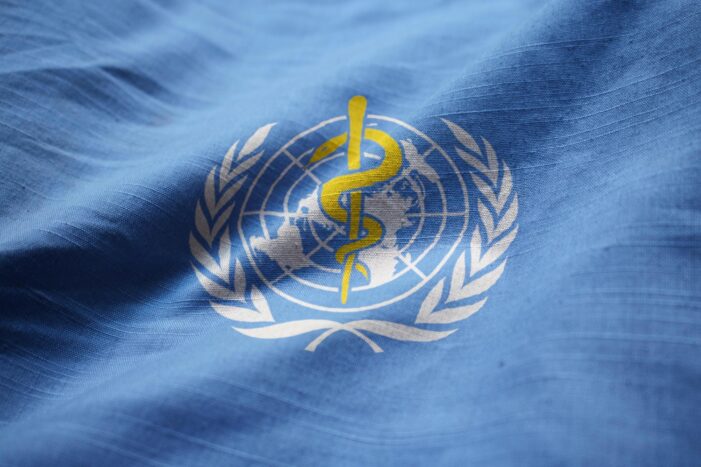
Source

During Dec. 2-3, 2019, the World Health Organization (WHO) held a Global Vaccine Safety Summit in Geneva, Switzerland. It was billed as an event for “vaccine safety stakeholders.” Attendees included current and former members of the Global Advisory Committee on Vaccine Safety (GACVS), which provides “independent, authoritative, scientific advice” to WHO on vaccine safety issues of international concern that may have a short- or long-term impact on national vaccination programs.1 2
Other attendees at the summit included WHO pharmacovigilance staff from all regions, vaccination program managers, national regularly authorities and representatives of United Nations agencies, academic institutions, umbrella organizations of pharmaceutical companies, technical partners, industry representatives and funding agencies.1 It appears that everyone who is anyone with regard to national or global vaccination programs and public policy was at this event, so it was a big deal in the world of vaccines.
In her opening comments to the attendees, the WHO’s Deputy Director-General Dr. Zsuzsanna Jakab characterized the summit as a “very very important” meeting involving the “highly important” and “very crucial” issue of vaccine safety. She stressed the importance of the WHO investing “a lot” into vaccine safety.1 Dr. Jakab explained:
Because vaccines are given to millions of healthy people, including healthy children, it is very important that we maintain high safety standards. And this is the role and responsibility of different experts. First of all, monitoring the safety of the vaccines is a joint responsibility between the immunizations programs and the regulators. The immunization programs have to inform the patients and the caregivers and ensure the safest administration of the vaccines. The regulators validate the quality, the safety and the efficacy of the products that are licensed in the countries. And vaccine safety surveillance also requires open minds and open mindedness, considering and respecting that everybody’s safety concerns are well considered and all the necessary measures are taken to respond to this.1
Dr. Jakab added: “There are sometimes wrong perceptions, poor science or vaccination errors that are the main vaccine safety problems.1 This simple admission was significant, given how often the mantra “vaccines are safe and effective” is recited by many doctors, public health officials, legislators and representatives of the vaccine industry. But it was nothing compared to the remarks of some of the attendees.
Perhaps the most enlightening remarks about vaccine safety were made by Heidi Larson, PhD, professor of anthropology and director of the Vaccine Confidence Project. Dr. Larson stressed:
There’s a lot of safety science that’s needed. Without the good science, we can’t have good communication. So, although I’m talking about all these other contextual issues and communication issues, it absolutely needs the science as the backbone. You can’t repurpose the same old ‘science’ to make it sound better if you don’t have the science that’s relevant to the new problems. So we need much more investment in safety science.3
You cannot repurpose the same old science to make it sound better? That says a lot because it essentially undermines another common mantra in the debate about vaccines—that vaccine science is settled. Dr. Larson pointed out what would seem obvious to even the lay person, and that is that there are such things as poor science and old science. Consequently, there is always a need to continually revise and update scientific knowledge, including scientific knowledge about vaccines.
Soumya Swaminathan, MD, chief scientist with the WHO, confirmed that there is much that is not known about vaccine safety because surveillance is often not what it should be. Dr. Swaminathan said:
I think we cannot overemphasize the fact that we really don’t have very good safety monitoring systems in many countries, and this adds to the miscommunication and the misapprehensions because we’re not able to give clear-cut answers when people ask questions about the deaths that have occurred due to a particular vaccine….3
One should be able to give a very factual account of exactly has happened and what the cause of [the] deaths are, but in most cases there is some obfuscation at that level and, therefore, there is less and less trust, then, in the system.3
The acknowledgement here is that some people die after getting one or more vaccinations. This is not a common admission within the medical community and public health profession because it tends to weaken the “vaccines are safe” half of the “vaccines are safe and effective” mantra. The implication is that, most often, when someone dies following vaccination, there is an effort by health authorities to ignore or conceal the truth of what may have happened in relationship to recently received vaccinations. The logical question is, “Why?” and “If so, then how is it possible to have any certainty about how safe vaccines really are?
Dr. Stephen Evans, professor of pharmacoepidemiology at the London School of Hygiene and Tropical Medicine, further speculated about the difficulty in fully understanding the safety of vaccines. He made comments about the unpredictability of the potential reactogenic effects of the adjuvants added to vaccines. He said:
It seems to me that adjuvants multiply the immunogenicity of the antigens that they are added to, and that is their intention. It seems to me they multiply the reactogenicity in many instances, and therefore it seems to me that it is not unexpected if they multiply the incidence of adverse reactions that are associated with the antigen, but may not have been detected through lack of statistical power in the original studies.3
Martin Howell Friede, PhD, coordinator for the WHO’s Initiative for Vaccine Research, agreed with Dr. Evans on this point. However, he noted that the main concern was not about local adverse reactions to vaccinations, but rather about related “systemic” adverse events. “[T]his is not the major health concern. The major health concerns which we are seeing are accusations of long-term, long-term effects,” Dr. Evans said.3
In other words, not only is it possible that immediate and observable adverse reactions to vaccines are being underestimated, it is possible that acute vaccine reactions may lead to and eventually manifest as more serious and systemic long-term poor health outcomes.
These and other uncertainties about vaccine safety are one of the reasons that many doctors and other medical personnel are, increasingly, questioning vaccines. “The other thing that’s a trend and an issue is not just confidence in providers but confidence of health care providers,” Dr. Larson observed. “We have a very wobbly health professional frontline that is starting to question vaccines and the safety of vaccines.”3
In part, Dr. Larson attributed the problem of waning confidence in vaccines by health professionals and their lack of confidence in answering patient questions about vaccine safety to their lack of expertise on the issue. “I mean most medical school curriculums, even nursing curriculums… I mean, in medical school you are lucky if you have a half day on vaccines, never mind keeping up to date with all this,” Dr. Larson said.3
References:

Truth Comes to Light highlights writers and video creators who ask the difficult questions while sharing their unique insights and visions.
Everything posted on this site is done in the spirit of conversation. Please do your own research and trust yourself when reading and giving consideration to anything that appears here or anywhere else.










